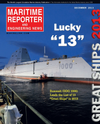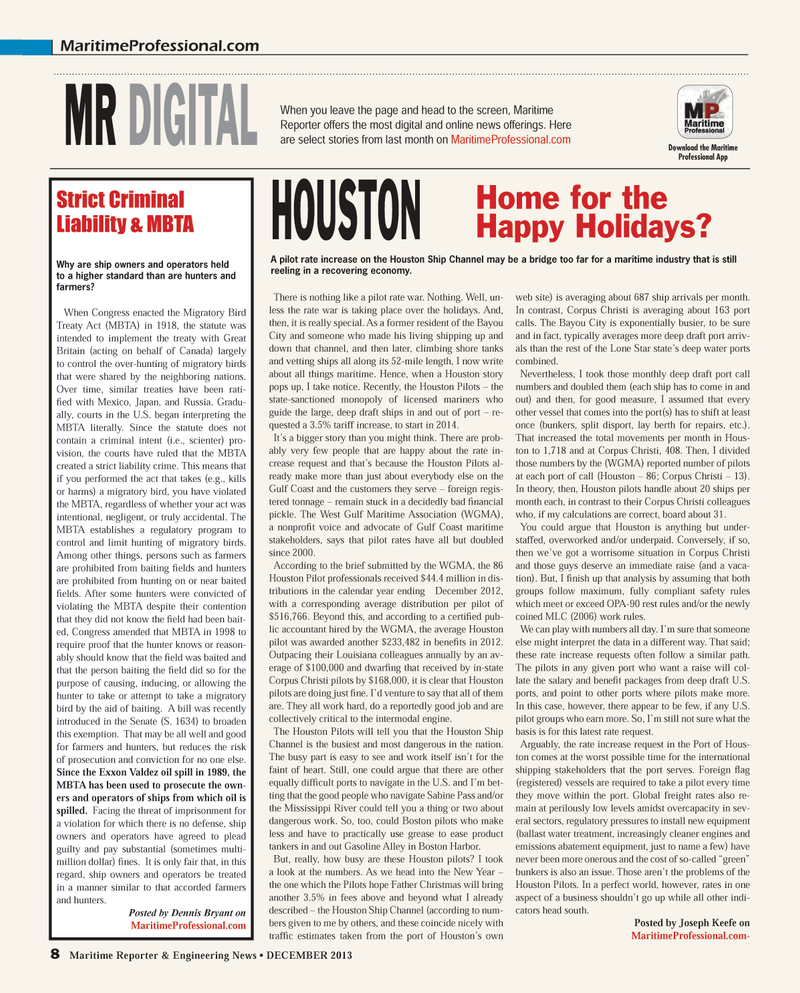
Page 8: of Maritime Reporter Magazine (December 2013)
Great Ships of 2013
Read this page in Pdf, Flash or Html5 edition of December 2013 Maritime Reporter Magazine
8 Maritime Reporter & Engineering News ? DECEMBER 2013 MR DIGITAL When you leave the page and head to the screen, Maritime Reporter offers the most digital and online news offerings. Here are select stories from last month on MaritimeProfessional.comThere is nothing like a pilot rate war. Nothing. Well, un- less the rate war is taking place over the holidays. And, then, it is really special. As a former resident of the Bayou City and someone who made his living shipping up and down that channel, and then later, climbing shore tanks and vetting ships all along its 52-mile length, I now write about all things maritime. Hence, when a Houston story pops up, I take notice. Recently, the Houston Pilots ? the state-sanctioned monopoly of licensed mariners who guide the large, deep draft ships in and out of port ? re- quested a 3.5% tariff increase, to start in 2014. It?s a bigger story than you might think. There are prob- ably very few people that are happy about the rate in-crease request and that?s because the Houston Pilots al- ready make more than just about everybody else on the Gulf Coast and the customers they serve ? foreign regis-tered tonnage ? remain stuck in a decidedly bad Þ nancial pickle. The West Gulf Maritime Association (WGMA), a nonproÞ t voice and advocate of Gulf Coast maritime stakeholders, says that pilot rates have all but doubled since 2000.According to the brief submitted by the WGMA, the 86 Houston Pilot professionals received $44.4 million in dis-tributions in the calendar year ending December 2012, with a corresponding average distribution per pilot of $516,766. Beyond this, and according to a certiÞ ed pub- lic accountant hired by the WGMA, the average Houston pilot was awarded another $233,482 in beneÞ ts in 2012. Outpacing their Louisiana colleagues annually by an av-erage of $100,000 and dwarÞ ng that received by in-state Corpus Christi pilots by $168,000, it is clear that Houston pilots are doing just Þ ne. I?d venture to say that all of them are. They all work hard, do a reportedly good job and are collectively critical to the intermodal engine.The Houston Pilots will tell you that the Houston Ship Channel is the busiest and most dangerous in the nation. The busy part is easy to see and work itself isn?t for the faint of heart. Still, one could argue that there are other equally difÞ cult ports to navigate in the U.S. and I?m bet- ting that the good people who navigate Sabine Pass and/or the Mississippi River could tell you a thing or two about dangerous work. So, too, could Boston pilots who make less and have to practically use grease to ease product tankers in and out Gasoline Alley in Boston Harbor. But, really, how busy are these Houston pilots? I took a look at the numbers. As we head into the New Year ? the one which the Pilots hope Father Christmas will bring another 3.5% in fees above and beyond what I already described ? the Houston Ship Channel (according to num-bers given to me by others, and these coincide nicely with trafÞ c estimates taken from the port of Houston?s own web site) is averaging about 687 ship arrivals per month. In contrast, Corpus Christi is averaging about 163 port calls. The Bayou City is exponentially busier, to be sure and in fact, typically averages more deep draft port arriv-als than the rest of the Lone Star state?s deep water ports combined.Nevertheless, I took those monthly deep draft port call numbers and doubled them (each ship has to come in and out) and then, for good measure, I assumed that every other vessel that comes into the port(s) has to shift at least once (bunkers, split disport, lay berth for repairs, etc.). That increased the total movements per month in Hous-ton to 1,718 and at Corpus Christi, 408. Then, I divided those numbers by the (WGMA) reported number of pilots at each port of call (Houston ? 86; Corpus Christi ? 13). In theory, then, Houston pilots handle about 20 ships per month each, in contrast to their Corpus Christi colleagues who, if my calculations are correct, board about 31.You could argue that Houston is anything but under- staffed, overworked and/or underpaid. Conversely, if so, then we?ve got a worrisome situation in Corpus Christi and those guys deserve an immediate raise (and a vaca-tion). But, I Þ nish up that analysis by assuming that both groups follow maximum, fully compliant safety rules which meet or exceed OPA-90 rest rules and/or the newly coined MLC (2006) work rules.We can play with numbers all day. I?m sure that someone else might interpret the data in a different way. That said; these rate increase requests often follow a similar path. The pilots in any given port who want a raise will col-late the salary and beneÞ t packages from deep draft U.S. ports, and point to other ports where pilots make more. In this case, however, there appear to be few, if any U.S. pilot groups who earn more. So, I?m still not sure what the basis is for this latest rate request.Arguably, the rate increase request in the Port of Hous- ton comes at the worst possible time for the international shipping stakeholders that the port serves. Foreign ß ag (registered) vessels are required to take a pilot every time they move within the port. Global freight rates also re-main at perilously low levels amidst overcapacity in sev-eral sectors, regulatory pressures to install new equipment (ballast water treatment, increasingly cleaner engines and emissions abatement equipment, just to name a few) have never been more onerous and the cost of so-called ?green? bunkers is also an issue. Those aren?t the problems of the Houston Pilots. In a perfect world, however, rates in one aspect of a business shouldn?t go up while all other indi- cators head south.Posted by Joseph Keefe on MaritimeProfessional.com- Home for the Happy Holidays?MaritimeProfessional.comStrict Criminal Liability & MBTA Why are ship owners and operators held to a higher standard than are hunters and farmers?When Congress enacted the Migratory Bird Treaty Act (MBTA) in 1918, the statute was intended to implement the treaty with Great Britain (acting on behalf of Canada) largely to control the over-hunting of migratory birds that were shared by the neighboring nations. Over time, similar treaties have been rati-Þ ed with Mexico, Japan, and Russia. Gradu- ally, courts in the U.S. began interpreting the MBTA literally. Since the statute does not contain a criminal intent (i.e., scienter) pro-vision, the courts have ruled that the MBTA created a strict liability crime. This means that if you performed the act that takes (e.g., kills or harms) a migratory bird, you have violated the MBTA, regardless of whether your act was intentional, negligent, or truly accidental. The MBTA establishes a regulatory program to control and limit hunting of migratory birds. Among other things, persons such as farmers are prohibited from baiting Þ elds and hunters are prohibited from hunting on or near baited Þ elds. After some hunters were convicted of violating the MBTA despite their contention that they did not know the Þ eld had been bait- ed, Congress amended that MBTA in 1998 to require proof that the hunter knows or reason-ably should know that the Þ eld was baited and that the person baiting the Þ eld did so for the purpose of causing, inducing, or allowing the hunter to take or attempt to take a migratory bird by the aid of baiting. A bill was recently introduced in the Senate (S. 1634) to broaden this exemption. That may be all well and good for farmers and hunters, but reduces the risk of prosecution and conviction for no one else. Since the Exxon Valdez oil spill in 1989, the MBTA has been used to prosecute the own- ers and operators of ships from which oil is spilled. Facing the threat of imprisonment for a violation for which there is no defense, ship owners and operators have agreed to plead guilty and pay substantial (sometimes multi-million dollar) Þ nes. It is only fair that, in this regard, ship owners and operators be treated in a manner similar to that accorded farmers and hunters.Posted by Dennis Bryant onMaritimeProfessional.com HOUSTONA pilot rate increase on the Houston Ship Channel may be a bridge too far for a maritime industry that is still reeling in a recovering economy. Download the Maritime Professional AppMR #12 (1-9).indd 8MR #12 (1-9).indd 812/10/2013 12:52:48 PM12/10/2013 12:52:48 PM

 7
7

 9
9
